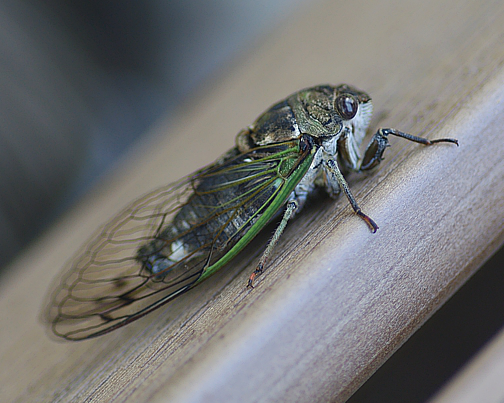An annual cicada's song is the quintessential music of August, a sonorous vocal offering from little jeweled beings who emerge from the ground, shed their nymph skins, climb high into the light-filled trees and sing for a handful of days before expiring and returning to earth. It's a joyful, ecstatic and poignant element in the slow, irrevocable turning of one northern season into another.
Only male cicadas sing, but oh how they do, vibrating the complex abdominal membranes called tymbals over and over again to generate a raspy tune that will attract a mate. I have much to learn about identifying cicadas, but I think this one is the bigger Linne's cicada, rather than a Dog-day cicada. Whichever one it was, my little visitor was absolutely gorgeous.
In ancient Greece and Rome, the cicada symbolized resurrection, immortality, and spiritual ecstasy. The Greeks associated it with the sun god (Apollo), and with Dionysian rituals of ecstasy and madness. For the Romans, its emergence from the earth was a powerful symbol of transformation and rebirth.
In some Hispanic cultures, particularly those with strong Mesoamerican traditions, the cicada is associated with life, death and metamorphosis. It represents resilience, defiance, enduring hardship and surviving against the odds.
In the southern French province of Provence, the cicada is viewed affectionately as a kindred spirit, a creature that loves the sun and makes music for the sheer joy of it. It is considered a lucky charm, and it is a popular motif in local art and crafts.
We (Beau and I) often find abandoned cicada shells on trees at this time of the year but always feel fortunate when we encounter a newborn in all its pastel green splendor, sometimes still clinging to its discarded exoskeleton. Imagos (adults) darken as their new skins harden and their wings expand, but there is some variation in coloration, and many will retain greenish wings all the days of their lives.
For the last few days, we have been rescuing cicadas from sidewalks, driveways and roadways and moving them to safe perches where they will not be trampled by pedestrians or moving cars. On early walks, Beau and I always encounter at least two or three before we arrive home again. Evenings, I take my mug of tea out to the garden and listen to cicada serenades before the sun goes down, and I shall be sad when I go outside one night, and there are no cicada songs to be heard.
Call it "cicada mind" and cherish the notion. Our task is one of cultivating just this kind of patience, acceptance, rapt attention and unfettered Zen sensibility, of embracing our allotted days fully and singing wherever we happen to be, then dissolving effortlessly back into the fabric of the world when the time comes.
























